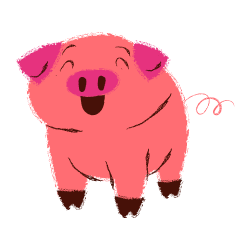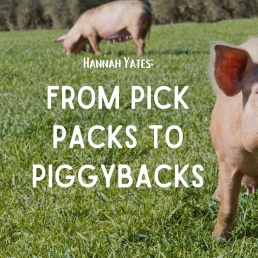Buongiorno! I’m Hannah, I’m 25, and I’m currently working as an English language assistant in La Spezia, Italy.
Over the past six years I’ve lived in as many countries, and throughout my travels I have always been fascinated by how language finds its way into everyday life.
This is the first of what will be a series of blogs exploring how languages relate to a series of seemingly unrelated parts of life, inspired by my experiences in the UK and abroad.
Today, we’ll be diving into a classic mode of transportation – the piggyback ride! For those unfamiliar with the concept, one person carries another by loading them onto their back and shoulders.


Now, I’d never really thought too much about why a piggyback was so-called, until a recent session of jiu jitsu training here in La Spezia.
As part of a training exercise, me and my training partner, Chiara, gave each other piggyback rides around the dojo. The exercise was described by our sensei as carrying the other ‘a cavalluccio’ which translates as carrying someone ‘as a little horse’.
Pretty cool, right?
And, as horses are known for carrying humans around, it makes perfect sense…
But how about ‘piggyback’? It’s not like pigs are famous for carrying people on their backs.
Well, as I explained the English translation to my sensei, he immediately reasoned that butchers used this method to carry dead pigs. Although I was slightly saddened at the thought of lugging pig carcasses around, it made a lot of sense.
I decided to look up the origins nonetheless, and it didn’t take long to find a brief history of the word ‘piggyback’, which actually has nothing to do with pigs at all!
Let’s go back to the 16th century. At this time, goods were largely transported in packs on people’s (or animals’) backs.
These became known as ‘pick packs’, the logic being that you had to pick it up to put it on your back.

However, as time moved forward, so did the language. ‘Pick pack’ became ‘pick-a-pack’, which became ‘pick-a-back’.
However, the ‘pick-a-back’ was often misheard as ‘pick-i-back’, and our natural tendency to make sense of what we hear resulted in the word ‘piggyback’.
Even if pigs weren’t known for carrying people or goods, ‘piggy’ was the only animal that sounded anything like ‘picky.’
This was used to describe these backpacks by the 19th century, but by the 1930s, the word was also used to describe riding on someone’s back and shoulders.
So, nothing to do with slinging pigs around at all!
What about other languages? Well, the French, carrying someone ‘à califourchon’, means ‘straddling’ or ‘astride’, in the context of horses.
The Spanish is almost identical to the Italian, ‘a caballito’ meaning ‘as a little horse’. It seems like horses are a common theme amongst Romance languages!
How about ‘piggyback’ in other international languages? Comment and let me know how you say ‘piggyback’ in a language you know, and what it literally translates too!
Baci, alla prossima!
Important words:
- A cavalluccio – ‘Like a little horse’ (Italian version of ‘piggyback’)
- À califourchon – ‘Straddling’ or ‘astride’ when talking about horses (French version of ‘piggyback’)
- A caballito – ‘As a little horse’ (Spanish version of ‘piggyback’)
- Baci, alla prossima! – ‘Kisses, until next time!’ (Italian)


